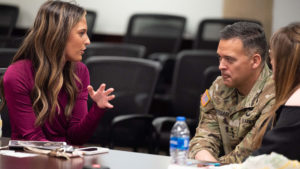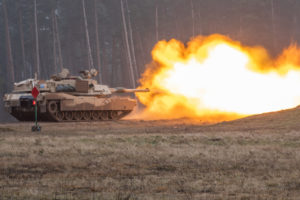
By Blair Dupre, Fort Hood (Now designated Fort Cavazos) Public Affairs
FORT HOOD (Now designated Fort Cavazos), Texas — Lt. Gen. Sean C. Bernabe, III Armored Corps and Fort Hood (Now designated Fort Cavazos) commanding general, and other Fort Hood (Now designated Fort Cavazos) leaders spoke to multiple media outlets in a media roundtable Feb. 23 at III Armored Corps and Fort Hood (Now designated Fort Cavazos) headquarters.
Bernabe began by explaining “The Phantom Six” which are six principles he issued on Oct. 4, 2022, with his commander’s intent. They state the importance of caring for Soldiers, Department of the Army civilians and their families; developing leaders who are proficient, engaged and empathetic; building teams that are cohesive, inclusive and disciplined; mastering the fundamentals; training crews, staffs and units to be proficient and lethal; and being ready.
“Those six things I think are critical to achieving (our) purpose,” he said. “I think it provides a useful framework to define what we do everyday and I think it’s a good touchstone that we use every single day.”
These principles were evident when he addressed the importance of Fort Hood (Now designated Fort Cavazos) and III Armored Corps units training alongside NATO allies.
“The reality is we’re not going to do an operation overseas somewhere without allies and partners,” Bernabe said. “Given that fact, we ought to train together. Every time we train we learn more about each other. We think we speak the same language … but they also have a little bit different way of doing military business than we do.”
He further explained that challenges can occur, especially with understanding and sharing information.
“There are some technical challenges (that may occur),” Bernabe said. “(We need to) make sure their computer systems can talk to ours so we can share information.”
He further explained there can be procedural challenges as well.
“If we do an operation as complex as a river crossing, hopefully their basic understanding of how to do it is the same as ours. And then there’s the human; do we know each other well enough that we can operate in a human organization together? We work all three of those dimensions.”
“There’s no doubt if we have to deploy somewhere to fight we’re going to have allies and partners with us,” he continued. “We want them with us. That is one of our advantages over any adversary in the world. There is no other nation in the world that has such a strong network of allies and partners.”
Col. Anthony Barbina, 36th Engineer Brigade commander, spoke on his personal experience in interacting with NATO allies during Defender Europe last year.
“On the 13th of May we executed a river crossing that was 185 meters full enclosure,” he explained. “It was Polish. It was Swedes. It was all about NATO. A few days later I was standing there as we did another river crossing in front of the president of Poland. He was so proud of his troops and everybody’s coming together. I had so many Soldiers that reenlisted from that multiple bridging company because they got to train with all these other nations. That’s why people join the military – is to see the world and do lots of interesting things. Multinational partnership and training are important to be ready to go do operations anywhere around the world, but it’s important for our Soldiers.”
Lt. Col. Erin Braswell, 1st Air Cavalry Brigade battalion commander, said while she was stationed in Romanian there were no U.S. forces near them, so they looked to NATO allies to train with on a day-to-day basis.
“Without them we weren’t really getting the juice for the squeeze,” she said. “Come down to my formation and you would hear great stories every day about how we trained with the Dutch, how we trained with the Romanians, how we trained with the Polish, the Latvians. Those relationships built will have lasting impacts. It truly has been life changing … for a lot of our Soldiers. It’s what keeps them around and makes them feel like a bigger part of the team.”
Col. Chad R. Foster, U.S. Army Garrison – Fort Hood (Now designated Fort Cavazos) commander, added that collaboration with NATO allies also happens right here at Great Place.
“Fires are not unusual and especially if the Air Cavalry Brigade is far from home and somewhere else, which happened last year, it’s not unusual to have Dutch aviators dropping water on fires here on Fort Hood (Now designated Fort Cavazos),” he said.
During the rest of the media roundtable, Bernabe and the other Fort Hood (Now designated Fort Cavazos) commanders addressed Army recruitment efforts and Soldiers’ wellbeing.
Then, Bernabe wrapped up the event.
“I’ll just go back to our purpose,” Bernabe stated. “We are here to provide our nation an armored corps prepared to fight, sustain and win in multidomain operations anywhere in the world. So, we want to ensure we’re prepared for anything that comes our way.”











